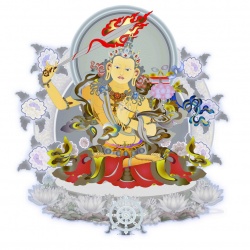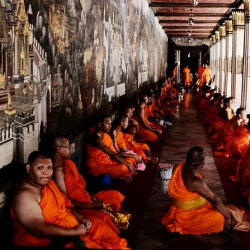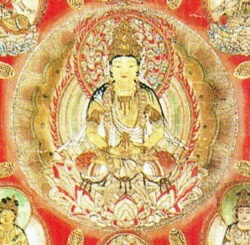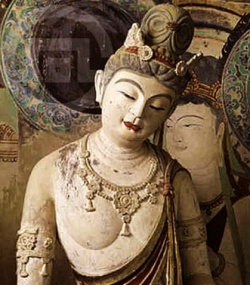Taking Refuge in the Three Jewels Kalu Rinpoche
TAKING REFUGE IS THE FIRST STEP on the Buddhist Path.
It is conducted as a formal ceremony during which a person officially becomes a Buddhist. It occurs for most of us as a natural outgrowth of learning about Buddhism and reflecting on what the teachings really mean to us in light of our human condition. It represents our first turning away from our own suffering in the world, and turning toward a genuine spiritual path that can be of benefit not only to ourselves but to others as well.
We take refuge in the Buddha by seeing him as the example of the sort of life we should lead in order to unfold our basic goodness and to realize freedom. We take refuge in the Dharma (the teachings of the Buddha and the experiences of truth that accompany them) by seeing them as the path that leads us to freedom. We take refuge in the Sangha (the community of practitioners) by seeing them as our companions who give us direction, feedback, friendship, and support. Refuge establishes the proper foundation for receiving teachings on and entering into practices of the Buddhist path.
Refuge Vow: Beginning on a Path toward Sanity
We all try our best to hide our issues (problems) and pretend that we are not aware of them, but no matter what we do in the mundane world, however popular we may be and whatever credentials we may have, certain problems and confusions will continue to confront us. Nor will these confusions be remedied by our ordinary intelligence, our ordinary ability to know and make interpretations of the world. It is possible for us to live our lives quite busily, to constantly experience a flurry of activity, but in the end we must face the fact that it did not bring any lasting meaning or purpose.
At that point, all we are left with is a tremendous sense of regret and loss. As death nears, we may begin to feel alone and helpless, but desiring protection and guidance at that time will not help. It is important that we make preparations while there is time and while conditions are favorable.
With this in mind, taking refuge is the beginning of the sane spiritual path. This path offers not only the possibility but the reality of cutting through and transforming our limitations, negative patterns, and confusion. So when we "take refuge, " we make a genuine link with the path leading towards the experience of sanity. And sanity, in this context, means liberation from the actual and potential confusion and sufferings that beings experience.
Why Taking Refuge Matters
The reason why the taking of refuge is so important is that at present we are immersed in samsara, which is an experience of suffering, an experience of impermanence, and an experience of constant change. If we wish to free ourselves from this, we cannot do so simply by ourselves. However, we can travel the path to liberation by relying upon the compassion of the Three Jewels. That is why it is necessary to go to them for refuge.
As ordinary beings, we do not know or understand the methods that we must engage in to obtain Buddhahood. For that reason we need a guide or a companion on the path to Buddhahood. This is something that can be explained by an example that is easily understood by Westerners. If one wanted to get from here to New York City and one tried to walk, one would either not get there at all or it would take a very long time. However, if one were to stand by the side of the road and put out one's thumb, then eventually some good minded individual would stop their car; one could get in and one would reach the city. It's the same way if we want to reach the City of Enlightenment. We have to hitchhike or take refuge in the Three Jewels.
The Basic Ingredients of “Waking Up”
Taking refuge in the Buddha means that our purpose is to achieve the experience of perfect enlightenment, just as he did. We should understand that the Buddha did not achieve enlightenment overnight--he had to follow the path. He was originally an ordinary being, yet by following the path with diligence and enthusiasm and a sense of tremendous joy, he attained what is called SANGYE in Tibetan: Buddhahood.
In order to achieve enlightenment, we have to follow the path. The path toward enlightenment is called Dharma, so the second source of refuge is the Dharma. Dharma redirects us from what is negative to that which is positive, from the mistaken to the correct. Dharma is also healing--it heals the wounds of the mind. It heals our physical senses. Since Dharma is the path, we need to take refuge in Dharma to accomplish Buddhahood.
As much as we would all like to correct ourselves and to be free from all confusion and suffering and to experience enlightenment, without the Sangha, which means community, such a method as the path of Dharma might not be available in our time. It is because of the devotion of the Sangha that the path taught by Buddha has been passed down from teacher to student, and is still available in our time. Although we want to achieve the perfection of enlightenment, we will have no idea how to begin if we do not first depend on the Sangha.
Our Commitments in Taking Refuge
We can summarize these commitments into a simple maxim: we must do our best to make the best use of this precious human life. We can make our lives as positive as possible, directing ourselves in a meaningful way to attain realization. This is the simple way to acknowledge the refuge vow. All of us can make a realistic assessment of what kind of improvement and development and maturity we can attain in this lifetime. We can make a sincere, clear, and confirmed commitment towards that.
However, we should not limit ourselves in our aspirations by expecting too little; nor should we limit ourselves by expecting too much too soon. We must pray that we attain enlightenment and lead every sentient being to liberation. We must also remember that true maturity does not happen by accident nor by mistake. No sentient being has become enlightened by mistake. After we take refuge, we must cherish and uphold the refuge transmission that we receive. For that, we make a basic vow to keep the commitment firm. We should be happy and honored and uplifted and always fresh about it.
From Whom Do We Seek Refuge?
The answer is: seek refuge in Buddha, the enlightened being. You may or may not have heard the definition of Buddhahood. In English, the notion of enlightenment sometimes means simply understanding something you have not understood before. We might say, "I was enlightened by this or that explanation or information." This does not convey the meaning of the Tibetan term SANGYE, which means both Buddhahood and Buddha. The two syllables of SANGYE each have a meaning. SANG means elimination or absence. What is being eliminated, or what is absent here, is every neurosis, mental affliction, confusion--all the negative patterns. The second syllable, GYE, means "blossomed" or "fully developed." In the absence of all confusion and mental obscuration, what develops is the mind's potentials and qualities, such as wisdom and knowledge.
Is the development of these qualities temporary?. No, it is permanent. Once you have eliminated all obscuration and fully experienced or realized your own mind's qualities, you are a fully enlightened being. That is what is meant by SANGYE. It does not just mean the historical Buddha of our time (Shakyamuni). SANGYE means the elimination of faults, confusion, and the full development of wisdom qualities--which is to say, Buddhahood.
Wisdom, Compassion and the Proper Mental Attitude for the Refuge Ceremony
The qualities that make us a proper recipient and practitioner of the mahayana teachings are, first, self-confidence or courage and second, wisdom. The courage or self-confidence is based on understanding that every living being is experiencing suffering. Whatever suffering we have gone through in the past, tolerable or
intolerable, and whatever suffering we are going through now, all living beings suffer in the same way.
They may not be experiencing exactly the same kind of pain, but they are always experiencing suffering and unfavorable conditions. All beings, indulging ourselves, try to avoid such pain and its causes but, since we are lacking in wisdom and are subject to confusion, we still always end up experiencing suffering. This is proof that whatever approach we and other beings have used in the past is not the ultimate or proper method.
Knowing that, we should include all living beings in our aspiration toward liberation, not just ourselves. Contemplate that all these living beings, through their confusion, believe they are in the proper path to happiness but, as a result of the confusion, they are not. By really understanding that everyone has suffering and confusion and is trying to overcome those problems, but that all the methods they have used have not brought them liberation, we develop the experience of limitless compassion. From this compassion comes the possibility of having the courage to guide all beings--not one or two, but all--to enlightenment. We should work to develop this compassion and courage.
The possibility of working in the proper way toward enlightenment--motivating ourselves in accordance with the mahayana view--is taught to us by our mahayana spiritual friend. As I said, the influence, or association, is important, and spiritual friends are quite helpful. There are also those who, without having to be taught, are naturally filled with compassion--not for themselves, but compassion toward all living beings.
That is an evidence that this particular individual has practiced in the previous life. His or her obscurations or delusion of mind are less thick. It does not mean there are no obscurations, but there are fewer. As a result of this, these people experience natural compassion toward all beings without being taught. Therefore, we must genuinely rejoice if we have natural compassion toward all living beings.
Instructions concerning taking refuge are given before the ceremony itself, since having the proper mental attitude during the ceremony is essential for obtaining the refuge transmission. At the time of the ceremony, there is really not much to do. You simply sit, repeat the Tibetan words, and you receive the refuge. If you do not know what you are doing, why you are doing it, and what state of mind you should have, then you are simply sitting and repeating an unknown language. Since it is important not only to repeat the words but to know what you are repeating and what state of mind you should have, I have given this instruction.
If someone participates in the refuge ceremony without any knowledge of refuge, and without even knowing the words they are repeating, it would be like a bucket with holes in it. No matter what you put in, it runs out through the holes. If a person has some knowledge of refuge but is not aspiring toward enlightenment, and if they take refuge with a goal of happiness and prosperity of this and the next life, then they will have refuge, but they will be unable to reach enlightenment because they have not aspired to enlightenment. To enable you to be a perfect recipient of the refuge vow, I have given a complete explanation of the objects of refuge, and what state of mind you need to have.
Particularly, it is important to take the attitude of including all living beings with a sense of compassion, and wanting to guide them to liberation. This makes you a very proper vessel, one without any holes at all. When you are a proper vessel, even if what you are putting in is a small amount, adding it to the container drop by drop every day, it is possible eventually to fill it up. You are not lacking a goal. Therefore, I have given these instructions. In order to become a proper vessel to move toward enlightenment, refuge is essential.
Surrendering and Taking Refuge
At this point we may have come to the conclusion that we should drop t he whole game of spiritual materialism; that is, we should give up trying to defend and improve ourselves. We may have glimpsed that our struggle is futile and may wish to surrender, to completely abandon our efforts to defend ourselves. But how many of us could actually do this? It is not as simple and easy as we might think. To what degree could we really let go and be open? At what point would we become defensive?
In this lecture we will discuss surrendering, particularly in terms of the relationship between work on the neurotic state of mind and work with a personal guru or teacher. Surrendering to the "guru" could mean opening our minds to life-situations as well as to an individual teacher. However, if our life-style and inspiration is working toward an unfolding of the mind, then we will almost certainly find a personal guru as well. So in the next few talks we will emphasize relating to a personal teacher.
One of the difficulties in surrendering to a guru is our preconceptions regarding him and our expectations of what will happen with him. We are preoccupied with ideas of what we would like to experience with our teacher: "I would like to see this; that would be the best way to see it; I would like to experience this particular situation, because it is in exact accordance with my expectation and fascination." So we try to fit things into pigeonholes, try to fit the situation to our expectations, and we cannot surrender any part of our anticipation to all. If we search for a guru or teacher, we expect him to be saintly, peaceful, quiet, a simple and wise man.
When we find that he does not match our expectations, then we begin to be disappointed, we begin to doubt. In order to establish a real teacher-student relationship it is necessary for us to give up all our preconceptions regarding that relationship and the condition of opening and surrender. "Surrender" means opening oneself completely, trying to get beyond fascination and expectation. Surrender also means acknowledging the raw, rugged, clumsy and shocking qualities of one's ego, acknowledging them and surrendering them as well.
Generally, we find it very difficult to give out and surrender our raw and rugged qualities of ego. Although we may hate ourselves, at the same time we find our self-hatred a kind of occupation. In spite of the fact that we may dislike what we are and find that self-condemnation painful, still we cannot give it up completely.
If we begin to give up our self-criticism, then we may feel that we are losing our occupation, as though someone were taking away our job. We would have no further occupation if we were to surrender everything; there would be nothing to hold on to. Self-evaluation and self-criticism are, basically, neurotic tendencies which derive from our not having enough confidence in ourselves, "confidence" in the sense of seeing what we are, knowing what we are, knowing we can afford to open. We can afford to surrender that raw and rugged neurotic quality of self and step out of fascination, step out of preconceived ideas.
We must surrender our hopes and expectations, as well as our fears, and march directly into disappointment, work with disappointment, go into it and make it our way of life, which is a very hard thing to do. Disappointment is a good sign of basic intelligence. It cannot be compared to anything else: it is so sharp, precise, obvious and direct. If we can open, then we suddenly begin to see that our expectations are irrelevant compared with the reality of the situations we are facing.
This automatically brings a feeling disappointment.
Disappointment is the best chariot to use on the path of the dharma. It does not confirm the existence of our ego and its dreams. However, if we are involved with spiritual materialism, if we regard spirituality as a part of our accumulation of learning and virtue, if spirituality becomes a way of building ourselves up, then of course the whole process of surrendering is completely distorted.
If we regard spirituality as a way of making ourselves comfortable, then whenever we experience something unpleasant, a disappointment, we try to rationalize it: "Of course this must be an act of wisdom the part of the guru, because I know, I'm quite certain the guru doesn't do harmful things. Guruji is a perfect being and whatever Guruji does is right. Whatever Guruji does is for me, because he is on my side. So I can afford to open.
I can safely surrender. I know that I am treading on the right path." Something is not quite right about such an attitude. It is, at best, simple-minded and naive. We are captivated by the awesome, inspiring, dignified and colorful aspect of "Guruji." We dare not contemplate any other way. We develop the conviction that whatever we experience is part of our spiritual development. "I've made it, I have experienced it, I am a self-made person and I know everything, roughly, because I've read books and they confirm my beliefs, my rightness, my ideas. Everything coincides."
We can old back in still another way, not really surrendering because we feel that we are very genteel, sophisticated and dignified people. "Surely we can't give ourselves to this dirty, ordinary street-scene of reality." We have the feeling that every step of the path should be a lotus petal and we develop a logic that interprets whatever happens to us accordingly. If we fall, we create a soft landing which prevents sudden shock. Surrendering does not involve preparing for a soft landing; it means just landing on hard, ordinary ground, on rocky, wild countryside. Once we open ourselves, then we land on what is.
Traditionally, surrendering is symbolized by such practices as prostration, which is the act of falling on the ground in a gesture of surrender. At the same time we open psychologically and surrender completely by identifying ourselves with the lowest of the low, acknowledging our raw and rugged quality. There is nothing that we fear to lose once we identify ourselves with the lowest of the low. By doing so, we prepare ourselves to be an empty vessel, ready to receive the teachings.
In the Buddhist tradition, there is this basic formula:
"I take refuge in the Buddha, I take refuge in the dharma, I take refuge in the sangha." I take refuge in the Buddha as the example of surrender, the example of acknowledging negativity as part of our makeup and opening to it. I take refuge in the dharma - dharma, the "law of existence," life as it is. I am willing to open my eyes to the circumstances of life as they are. I am not willing to view them as spiritual or mystical, but I am willing to see the situations of life as they really are.
I take refuge in the sangha. "Sangha" means "community of people on the spiritual path," "companions." I am willing to share my experience of the whole environment of life with my fellow pilgrims, my fellow searchers, those who walk with me; but I am not willing to lean on them in order to gain support. I am only willing to walk along with them. There is a very dangerous tendency to lean on one another as we tread the path. If a group of people leans one upon the other, then if one should happen to fall down, everyone falls down. So we do not lean on anyone else. We just walk with each other, side by side, shoulder to shoulder, working with each other, going with each other.
This approach to surrendering, this idea of taking refuge is very profound.
The wrong way to take refuge involves seeking shelter - worshipping mountains, sun gods, moon gods, deities of any kind simply because they would seem to be greater than we. This kind of refuge taking is similar to the response of the little child who says, "If you beat me, I'll tell my mommy," thinking that his mother is a great, archetypically powerful person. If he is attacked, his automatic recourse is to his mother, an invincible and all-knowing, all-powerful personality.
The child believes his mother can protect him, in fact that she is the only person who can save him. Taking refuge in a mother or father-principle is truly self-defeating; the refuge-seeker has no real basic strength at all, no true inspiration. He is constantly busy assessing greater and smaller powers. If we are small, then someone greater can crush us. We seek refuge because we cannot afford to be small and without protection. We tend to be apologetic: "I am such a small thing, but I acknowledge your great quality. I would like to worship and join your greatness, so will you please protect me?"
Surrendering is not a question of being low and stupid, nor wanting to be elevated and profound. It has nothing to do with levels and evaluation. Instead, we surrender because we would like to communicate with the world "as it is." We do not have to classify ourselves as learners or ignorant people. We know where we stand, therefore we make the gesture of surrendering, of opening , which means communication, link, direct communication with the object of our surrendering. We are not embarrassed about our rich collection of raw, rugged, beautiful and clean qualities. We present everything to the object of our surrendering. The basic act of surrender does not involve the worship of an external power. Rather it means working together with inspiration, so that one becomes an open vessel into which knowledge can be poured.
Thus openness and surrendering are the necessary preparation for working with a spiritual friend. We acknowledge our fundamental richness rather than bemoan the imagine poverty of our being. We know we are worthy to receive the teachings, worthy of relating ourselves to wealth of the opportunities for learning.
It is possible to attain full buddhahood
simply through the genuine taking of refuge.
What is meant by buddhahood is the recognition
and realization of the complete purity of the mind.









